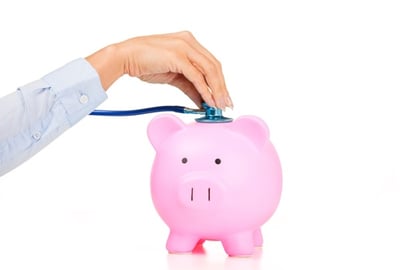Keep Your Account Balance Healthy
4 simple ways to stay on top of your transactions
 Account balance monitoring is a task that everyone should be doing, but many people aren’t. You might just assume the bank will handle the account balance monitoring for you; after all, it's not an uncommon assumption. But, there is more to managing your money than simply ending spending when you run out of cash. Monitoring your account balance can help with everything from budgeting, to paying bills, to cutting down on your daily spending habits. It will also help your account balance stay healthy, so you never run out of money again.
Account balance monitoring is a task that everyone should be doing, but many people aren’t. You might just assume the bank will handle the account balance monitoring for you; after all, it's not an uncommon assumption. But, there is more to managing your money than simply ending spending when you run out of cash. Monitoring your account balance can help with everything from budgeting, to paying bills, to cutting down on your daily spending habits. It will also help your account balance stay healthy, so you never run out of money again.
Keep Good Records
You’ve probably seen a checking account register, but odds are you don’t keep one. The idea of an account register seems to have gone the way of the dinosaurs somewhere around the early 2000s, but keeping an accurate record of your debits and credits is an easy way to facilitate account balance monitoring. If you don’t want to put pen to paper and write down everything you’ve purchased, you aren’t alone. Check out the app store on your phone; you’ll find dozens of apps that will help you quickly and efficiently monitor your account.
Keeping good records is also an excellent way to spot fraud, duplicate payments, or other common mistakes that could be costing you big. The quicker you spot these problems, the easier they are to rectify, so it is a good idea to get a bit more proactive with your record keeping.
Stop Swiping with Abandon
It can be easy to use your debit card everywhere you go. Swiping your card anywhere from 3 to 10 times a day isn’t uncommon for many 20-somethings, but it might be leading to poor checking account health. According to experts, when you use your card for every purchase you make, both large and small, it can be easy to lose track of your daily spend. Not only can this lead to overspending, but it can cause your account to dip below a threshold you are comfortable with. Instead, consider taking out $20 in cash (from a free ATM) for your small daily purchases, and leave the debit card for larger trips and shopping.
Spend Quality Time with Your Account
Setting aside an hour or so on a Saturday or Sunday morning to keep your account healthy is a good idea. If you can set aside an hour to go to the gym, you can set aside the time to monitor your account. Compare your personal files with your online balance, and your checking account statements for discrepancies. You’ll also want to take a look at your transactions to make sure you aren’t paying for something you no longer use, like an auto-renew music subscription or magazine. Spending time with your account makes account balance monitoring easy. Plus, the more you do it, the more it will simply become second nature.
Set up Alerts and Set a Hard Stop
Discipline is key when dealing with account balance monitoring, but banks also have tools to help you manage your spending. Set up alerts for your account when you dip below a certain threshold (like $100). If your account falls below $100, you’ll need to put a full stop on spending until replenished. It might be hard at first to exercise this discipline, but as you budget your money more efficiently, you’ll find you can increase that threshold and rest easy knowing that your account is healthy and well-funded.
* Independent Bank is not recommending a specific application, and the user is responsible for researching the privacy/security policies before utilizing the service of these or other similar applications.
